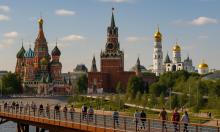Gagarin smile still shines on planet Earth
It is 40 years today since the first earthling’s flight into outer space. A modest Russian farm boy Yuri Gagarin was destined to complete such an epoch-making mission. Some international news agencies have responded to this remarkable anniversary with their detailed comments. Here is an article presented by Reuters under the title “Russia marks first space flight 40 years on” contributed by Karl Emerick Hanuska. It was 108 minutes on April 12, 1961 that made the difference to Yuri Gagarin and the world -- the time it took for the first man in space to complete his historic dash around the globe and blaze a trail to the stars. That trip transformed a former farm boy into one of the greatest icons of the 20th century and stunned the West with the realisation that for all its backwardness, the lumbering Soviet giant was capable of feats it could only dream of. "There aren't many achievements that can compare to what Gagarin did," said Pavel Popovich, one of the original team of six Soviet cosmonauts and a friend of Gagarin's. "No matter how much man ever manages to do in space, none of it will have the same resonance as when Yuri flew...but after putting the first man up there we know there are few barriers that can't be overcome," he told Reuters in an interview. Things are somewhat tougher 40 years on as Russian space chiefs struggle with the financial crises and conflicting priorities that have slowed progress and claimed victims such as the Mir space station, ditched in March because of a lack of funds. To the nation's rocketeers Gargarin's success is a proud symbol of the past, when they left U.S. scientists scrambling in their wake. It is also a beacon of hope for the future. Part of Gagarin's allure is that like so many of the century's great icons he died before his time, in a mysterious plane crash at the age of 34, just seven years after his historic trip. So forever he remains the youthful, vibrant figure who won the hearts of millions as he travelled the globe in what was the most successful propaganda effort the Soviet Union ever managed. DESTINED FOR GREATNESS Popovich, now 70 but still with a boisterous charm that hints of the charisma the original cosmonauts had, said when he first met Gagarin it was clear he was destined for greatness. "Yuri stood out from the rest of us. He was simple, gregarious, happy and full of life and curiosity...He was a genuinely nice guy," said Popovich, the fourth man to fly in space for the Soviet Union. "At one time they asked us cosmonauts who should be the first to go into space and every single one of us said Gagarin." Gagarin's charm won the approval of Soviet planners when they had to decide who would ride his way into history aboard the first manned space ship, the Vostok 1. His humble roots saw him narrowly edge out Gherman Titov, whose intellectual family and penchant for spouting poetry seemed to make him too bourgeois for a Soviet hero. Years later Titov said that while he still felt the disappointment of the choice, he grudgingly agreed with it. "Yuri was loveable, but no one could love me," Titov said in an interview shortly before his death last year. A NEED FOR HEROES The 40th anniversary of Gagarin's flight comes at a key time for the nation, just as the original event did. In a country battered by the political and economic upheaval of the decade since the Soviet collapse, undisputed heroes are in short supply, as is the pride that Gagarin inspired. So officials have set about trying to recreate some of that mood by remembering Gagarin with ceremonies and exhibits and feting those few who remain of the original cosmonaut corps. The situation in Russia now is not unlike it was 40 years ago when the scars of World War Two and of dictator Joseph Stalin's purges had yet to heal. Handsome, quick-witted and just sufficiently self-deprecating, Gagarin was the perfect figure to bring the nation together and turn people towards the future they were meant to be building. On trips abroad where musicians, politicians and movie stars jostled one other just to shake his hand, he smashed the Western stereotype of the crude, backwards Soviets. In a moment captured in one famous photograph, actress Gina Lollobrigida pushed through a crowded room to plant a kiss on Gagarin's cheek, fulfilling a personal ambition. "There's never been another hero like him and there never will be," insisted Dasha, a 13- year-old girl, during a visit to a Moscow museum where many relics of Gagarin's flight are kept. "We don't really have any kind of heroes today, but Yuri Gagarin was one that we can always remember." Yet despite his legendary status, Gagarin proved to be not quite the perfect hero. Soviet officials frequently complained about drinking binges and tales of his alleged adultery had to be quietly hushed up, including an incident where he was caught by his wife with another woman and injured himself leaping from a hotel balcony. But those problems have done little to tarnish Gagarin's image. Yuri Biryukov, an engineer who helped build the capsule that Gagarin rode, said he had never lost his wonder of Gagarin and the men who took the world's first great leaps into space. "For all of us these men were like superheroes, larger than life. We knew then that Gagarin was making history. Perhaps then we even understood better than Gagarin the significance of what he was going to do," Biryukov said. "We've never forgotten that we were the country that opened the way into space," he said. "We've never forgotten that Yuri Gagarin was the man who showed we could do it."
Subscribe to Pravda.Ru Telegram channel, Facebook, RSS!




